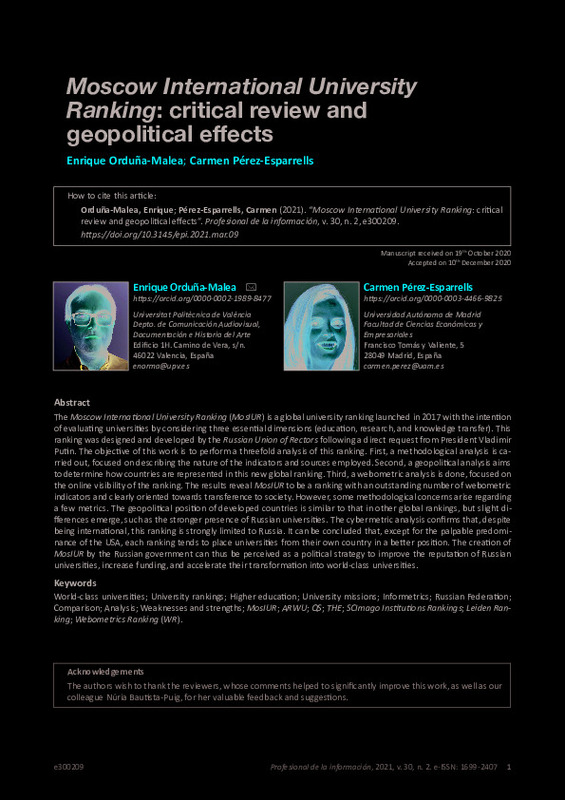Altbach, Philip G.; Hazelkorn, Ellen (2017). “Pursuing rankings in the age of massification: for most - forget about it”. International higher education, n. 89, pp. 8-10. https://doi.org/10.6017/ihe.2017.89.9834
ARM (2017). Moscow International University Ranking “The Three University Missions” (MosIUR): Pilot edition. Analytical materials. Association of Rating, Ranking, and Other Performance Evaluations Makers. https://mosiur.org/files/analytics/RU-Pilot_Ranking-2017-Analytics-General.pdf
ARM (2018a). Mosiur criteria features: outcome study. Criterion: “university’s impact on society”. Association of Rating, Ranking, and Other Performance Evaluations Makers. https://mosiur.org/files/analytics/EN-Wikipedia_Alumni_Analytics.pdf
[+]
Altbach, Philip G.; Hazelkorn, Ellen (2017). “Pursuing rankings in the age of massification: for most - forget about it”. International higher education, n. 89, pp. 8-10. https://doi.org/10.6017/ihe.2017.89.9834
ARM (2017). Moscow International University Ranking “The Three University Missions” (MosIUR): Pilot edition. Analytical materials. Association of Rating, Ranking, and Other Performance Evaluations Makers. https://mosiur.org/files/analytics/RU-Pilot_Ranking-2017-Analytics-General.pdf
ARM (2018a). Mosiur criteria features: outcome study. Criterion: “university’s impact on society”. Association of Rating, Ranking, and Other Performance Evaluations Makers. https://mosiur.org/files/analytics/EN-Wikipedia_Alumni_Analytics.pdf
ARM (2018b). Moscow International University Ranking “The Three University Missions”. The report on the study of the criterion “The number of online courses of the university, published on the largest online platforms”. Association of Rating, Ranking, and Other Performance Evaluations Makers. https://mosiur.org/files/analytics/EN-MosIUR_MOOC_Analytics.pdf
ARM (2018c). Moscow International University Ranking “The Three University Missions”. Association of Rating, Ranking, and Other Performance Evaluations Makers. https://mosiur.org/files/analytics/BUL_Analitika_Tri_missii_Eng.pdf
ARM (2019a). International study contests. A study based on materials of The Three University Missions Moscow International University Ranking 2018. Association of Rating, Ranking, and Other Performance Evaluations Makers. https://mosiur.org/files/analytics/EN_MosIUR_Contests_Study_-_2019.pdf
ARM (2019b). Moscow International University Ranking. The Three University Missions. Association of Rating, Ranking, and Other Performance Evaluations Makers. https://mosiur.org/files/analytics/EN_MosIUR_2019_Analytical_Commentary.pdf
ARM (2020). Moscow International University Ranking. The Three University Missions. Association of Rating, Ranking, and Other Performance Evaluations Makers. https://mosiur.org/files/analytics/EN_MosIUR_2020_Analytical_Commentary.pdf
Docampo, Domingo (2008). “Rankings internacionales y calidad de los sistemas universitarios”. Revista de educación, v. 1, pp. 149-176. http://www.educacionyfp.gob.es/revista-de-educacion/numeros-revista-educacion/numeros-anteriores/2008/re2008/re2008-07.html
Hazelkorn, Ellen (2015). Rankings and the reshaping of higher education: The battle for world-class excellence. Hampshire (UK): Palgrave McMillan. ISBN: 978 1 137 44666 4
Jöns, Heike; Hoyler, Michael (2013). “Global geographies of higher education: The perspective of world university rankings”. Geoforum, v. 46, pp. 45-59. https://doi.org/10.1016/j.geoforum.2012.12.014
Landinez, Lina; Kliewe, Thorsten; Diriba, Habtamu (2019). “Entrepreneurial university indicators in global university rankings”. In: Kliewe, Thorsten; Kesting, Tobias; Plewa, Carolin; Baaken, Thomas. Developing engaged and entrepreneurial universities. Singapore: Springer, pp. 57-85. ISBN: 978 981 13 8129 4 https://doi.org/10.1007/978-981-13-8130-0
Lee, Jeongwoo (2013). “Creating world-class universities: implications for developing countries”. Prospects, v. 43, n. 2, pp. 233-249. https://doi.org/10.1007/s11125-013-9266-x
Marginson, Simon (2017). “Do rankings drive better performance?”. International higher education, n. 89, pp. 6-8. https://doi.org/10.6017/ihe.2017.89.9833
Meho, Lokman I. (2020). “Highly prestigious international academic awards and their impact on university rankings”. Quantitative science studies, v. 1, n. 2, pp. 824-848. https://doi.org/10.1162/qss_a_00045
Moed, Henk F. (2017). “A critical comparative analysis of five world university rankings”. Scientometrics, v. 110. n. 2, pp. 967-990. https://doi.org/10.1007/s11192-016-2212-y
Montesinos, Patricio; Carot, José-Miguel; Martínez, Juan-Miguel; Mora, Francisco (2008). “Third mission ranking for world class universities: Beyond teaching and research”. Higher education in Europe, v. 33, n. 2-3, pp. 259-271. https://doi.org/10.1080/03797720802254072
Pérez-Esparrells, Carmen (2020). “Una ensoñación al hilo del ranking de Shanghai”. Universidad: blog de Studia XXI. https://www.universidadsi.es/una-ensonacion-al-hilo-del-ranking-de-shanghai
Pérez-Esparrells, Carmen; Orduña-Malea, Enrique (2018). “Do the technical universities exhibit distinct behaviour in global university rankings? A Times Higher Education (THE) case study”. Journal of engineering and technology management, v. 48, pp. 97-108. https://doi.org/10.1016/j.jengtecman.2018.04.007
Safón, Vicente (2013). “What do global university rankings really measure? The search for the X factor and the X entity”. Scientometrics, v. 97, n. 2, pp. 223-244. https://doi.org/10.1007/s11192-013-0986-8
Safón, Vicente (2019). “Inter-ranking reputational effects: an analysis of the Academic Ranking of World Universities (ARWU) and the Times Higher Education World University Rankings (THE) reputational relationship”. Scientometrics, v. 121, n. 2, pp. 897-915. https://doi.org/10.1007/s11192-019-03214-9
Safón, Vicente; Docampo, Domingo (2020). “Analyzing the impact of reputational bias on global university rankings based on objective research performance data: the case of the Shanghai Ranking (ARWU)”. Scientometrics, v. 125, pp. 2129-2227. https://doi.org/10.1007/s11192-020-03722-z
Saisana, Michaela; D’Hombres, Béatrice; Saltelli, Andrea (2011). “Rickety numbers: Volatility of university rankings and policy implications”. Research policy, v. 40, n. 1, pp. 165-177. https://doi.org/10.1016/j.respol.2010.09.003
Sidorenko, Tatiana; Gorbatova, Tatiana (2015). “Efficiency of Russian education through the scale of world university rankings”. Procedia - Social and behavioral sciences, v. 166, pp. 464-467. https://doi.org/10.1016/j.sbspro.2014.12.555
Siwinski, Waldemar (2016). “What direction next for university rankings?”. University world news, November 18. https://www.universityworldnews.com/post.php?story=20161114224439415
Trigwell, Keith (2011). “Measuring teaching performance”. In: Shin Jung C.; Toutkoushian Robert K.; Teichler, Ulrich. University rankings. The changing academy - The changing academic profession in international comparative perspective. Dordrecht: Springer, pp. 165-181. ISBN: 978 94 007 1115 0 https://doi.org/10.1007/978-94-007-1116-7_9
Van-Raan, Anthony F. J. (2005). “Fatal attraction: Conceptual and methodological problems in the ranking of universities by bibliometric methods”. Scientometrics, v. 62, n. 1, pp. 133-143. https://doi.org/10.1007/s11192-005-0008-6
Yudkevich, Maria; Altbach, Philip G.; Rumbley, Laura E. (2015). “Global university rankings: The ‘Olympic Games’ of higher education?”. Prospects, v. 45, n. 4, pp. 411-419. https://doi.org/10.1007/s11125-015-9365-y
Zadorozhnyuk, Ivan E.; Kalashnik, Viacheslav M.; Kireev, Sergey V. (2018). Moscow International University Ranking “The Three University Missions” in the Global Educational Space. Vysshee obrazovanie v Rossii = Higher education in Russia, v. 27, n. 6, pp. 31-41.
[-]









